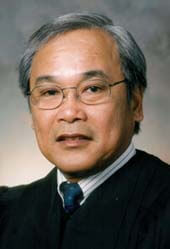
Celebrating the Life of Associate Justice Mario Ramil, June 21, 1946–January 30, 2017
Humble. Extraordinary. Brilliant. Mentor. A great friend. A true public servant. Just some of the words that friends, government officials, and those in the legal community used to described the late Hawai‘i Supreme Court Associate Justice Mario R. Ramil who died on January 30, 2017 at the age of 70. He is survived by his wife Judy and his two sons Jonathan and Bradley.
A storied career
Justice Ramil’s story is a great immigrant’s story. Born in Quezon City, Philippines in 1946, Ramil and his family moved to San Francisco when he was ten years old. In 1972, Ramil received his Bachelor of Arts degree from California State University Hayward. Three years later, Ramil earned his Juris Doctorate degree from the University of California Hastings College of Law.
Justice Ramil moved to Hawai‘i and in 1975, joined the State of Hawai‘i Department of Attorney General where he made life-long friends and began his career in public service. At that time, three other notable young Filipinos served as Deputy Attorneys General: Chris Pablo (assigned to the Department of Taxation), Abelina Shaw (assigned to the Department of Health), and Robin Campaniano (assigned to the Department of Education and the University of Hawai‘i). All four became politically active, contributed to the Filipino community, and become experts in various fields: Pablo in Health, Shaw in Government, and Campaniano in Insurance.
“When I met Mario in person the day he started at the AG’s office, we discovered we had both attended a meeting of Filipino attorneys in the Bay Area earlier that year. He was a recent law graduate and I was still in law school. We recalled we were both optimistic the meeting would start the formation of a bar association that could be very effective, and also helpful to us. However most of the meeting was focused on the debate of whether the organization was to be called the Filipino Bar Association of Northern California or the Pilipino Bar Association of Northern California. Years later, when Mario was an Associate Justice, he was asked to speak to that organization, I can’t remember what they called themselves,” recalled Campaniano.
Deputy Attorney General Ramil advised the Department of Labor and Industrial Relations (DLIR). His most significant accomplishment was his representation of Hawai‘i at the Ninth Circuit Court of Appeals and his testimony before committees in the U.S. House of Representatives and U.S. Senate to save Hawai‘i’s Prepaid Health Care Act of 1974 from being preempted by ERISA, the federal law which governs pension and health plans in private industry.
The mentorship
by Agsalud
At that time, DLIR Director Joshua Agsalud became Ramil’s confidant and mentor. Politically active in the rising Hawai‘i Democratic Party, Agsalud recruited Ramil, Campaniano, Pablo, and Shaw to be part of FFA (Filipinos for Ariyoshi). “Chris, Mario and I would always talk about what we could and should do for the Filipino community, and for Hawai‘i as a whole,” said Campaniano. “Our discussions started from our days in the AG’s office and would continue for the rest of our lives.”
When George Ariyoshi won the Governor’s office, he appointed Ramil in 1984 as his Insurance Commissioner. According to Campaniano, who followed Ramil as Insurance Commissioner, Ramil took over an underfunded and overwhelmed unit and quickly gained the trust and confidence of state legislators, as well as his fellow commissioners. During his tenure, Ramil substantially rolled back insurance rates against the wishes of the insurance companies. Ramil also took decisive action by naming himself as receiver of Financial Security Insurance Company (FSIC) when FSIC failed to pay claims in a timely fashion. Ramil also sued the owner of FSIC and related companies when he discovered they had misappropriated and misapplied FSIC’s funds and assets.
In 1987, Agsalud left DLIR to become Executive Assistant of newly elected Governor John Waihee and Ramil became Labor Director. Waihee, in a statement to the Star Advertiser, said he appointed Ramil because “He was very pro-consumer, pro-people and pro-little guy.” Ramil’s Professional Biography described his duties as DLIR Director as an administrator and enforcer of Hawai‘i’s labor laws, overseeing over 800 employees and a budget of approximately $175 million from state and federal funds. In his capacity as Director, Ramil also served as a Hearings Officer in contested cases, lobbied for the state administration at the legislature, interacted with employers and unions, and handled employee grievances filed by unions.
Ramil would serve as Labor Director until 1991 when he entered private practice with the Honolulu law firm of Lyons, Brandt, Cook and Hiramatsu.
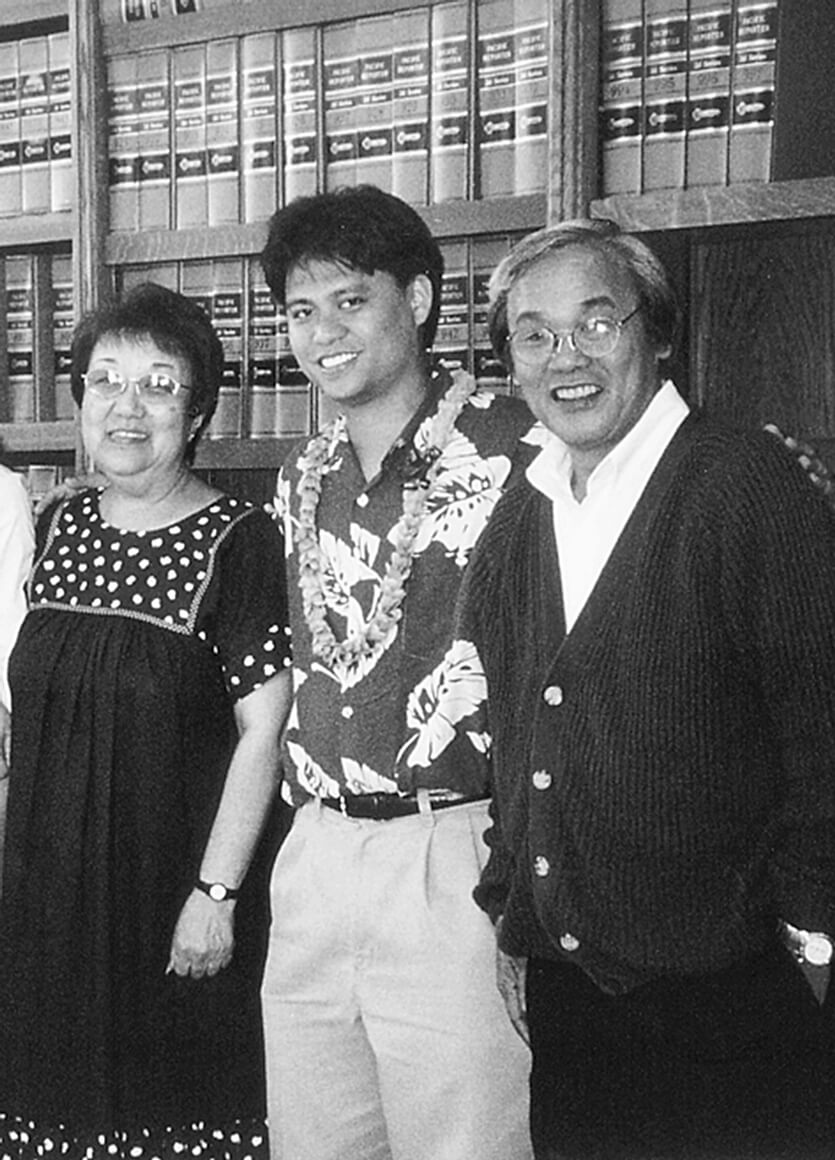
PHOTO COURTESY JAMESNER DUMLAO
Making the List
The death of Justice James Wakatsuki in late 1992 created a vacancy on the Hawai‘i Supreme Court. Ramil made the list of six but Waihee selected Sharon Himeno, the wife of his Attorney General. When the State Senate rejected Himeno by a 17–7 vote, Waihee had ten days to select from the original list. There was considerable pressure from women’s groups to appoint a female. Less significantly, there was also pressure from the Filipino community due to the dearth of Filipino judges. Behind the scenes, Agsalud lobbied Waihee to appoint his protégé and succeeded.
During the Senate confirmation process, Ramil spoke about his experience and what was needed on the Supreme Court: “I have been involved in politics, there’s no secret about that. But I made rulings against my friends when I was insurance commissioner. People understand that’s how you have to operate. My experience as insurance commissioner, as well as director of labor, are very relevant to the Supreme Court. We must have a Supreme Court with a human factor, with compassion and sensitivity. I also agree that the analytical side is very important, as is integrity.” The Senate Committee on Executive Appointments unanimously approved Ramil’s appointment and Ramil was subsequently confirmed by the entire State Senate.
A Part of History
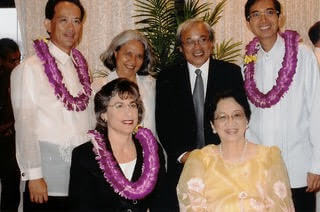
Photo courtesy: Robin Campaniano
When Ramil was sworn in as Associate Justice of the Supreme Court of Hawai‘i on May 13, 1993, he became only the second Supreme Court Justice of Filipino ancestry in the country, the first being another Hawai‘i Associate Justice, Benjamin Menor, who served from 1974 through 1981. Retired Associate Justice Simeon R. Acoba, Jr., who was appointed to the high court in 2000 and retired in 2014, said “Mario never forgot his roots and how fortunate it was that he had been appointed to the highest court in the state.” Ramil and Acoba would serve on the court together for two years. “It was not lost on us that it was the first time in the history of Hawai‘i that two justices of Filipino ancestry were serving at the same time on the Supreme Court. We felt this was a reflection of the progress that the Filipino community had made in so many other areas.” In 2014, the Filipino Community Center honored Ramil for his public service during the Center’s annual Bayanihan celebration. Acoba was also honored that evening.
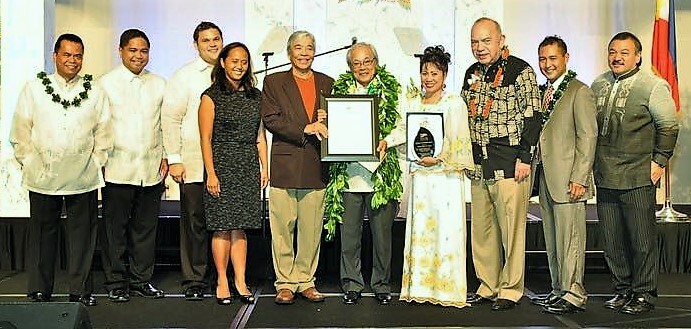
Photo courtesy: The Filipino Community Center, Inc.
On the Supreme Court, Ramil served as the Assignment Justice, responsible for reviewing and assigning appeals to the Intermediate Court of Appeals and to the individual Justices of the Hawai‘i Supreme Court.
Writing Opinions,
Concurrences, and
Dissents
As an Associate Justice, Ramil authored opinions in all areas of the law. Acoba said Ramil’s greatest impact was in the area of labor law. “Mario believed strongly in the right of collective bargaining and the worker’s right to bargain. He wrote a particular statute violated the Hawai‘i Constitution because the Hawai‘i Constitution protected the right ‘to engage in negotiations concerning… wages, hours, and other conditions of employment’. Mario said that right could not be eliminated by statute and was very adamant that a different reading would be ‘contrary to the underlying object and purpose of the constitutional provision’ and ‘meaningless.’”
Current Hawai‘i Supreme Court Chief Justice Mark Recktenwald expressed his sadness upon Ramil’s passing. “He was an outstanding justice who made a lasting impact on the Supreme Court, and a warm and caring person.”
Former law clerks spoke of his intellect, his compassion, and his support and mentorship. “Justice Mario Ramil was a bright, extraordinary man and jurist. I, along with his fellow law clerks, truly admired him. His passing is a great loss to our entire community,” said Lynn Araki-Regan, a past president of the Maui County Bar Association and who served as Ramil’s law clerk from 1995 to 1996.
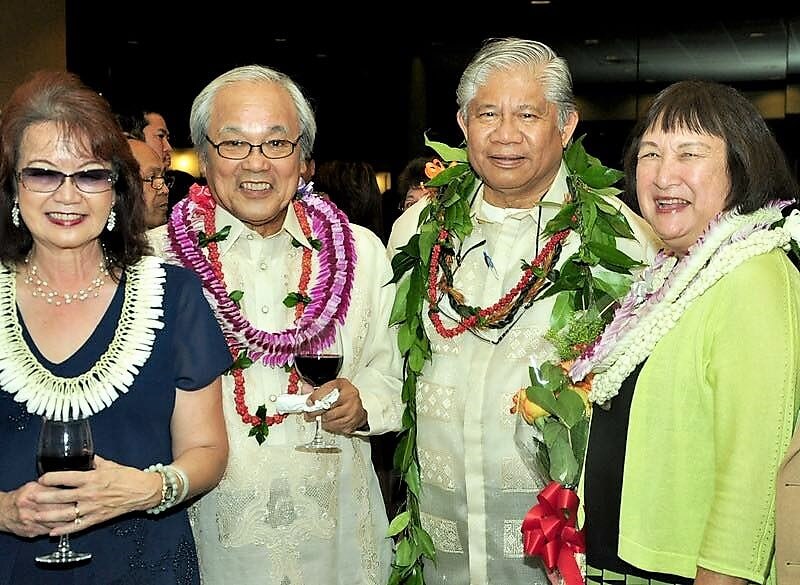
Photo courtesy: The Filipino Community Center, Inc.
Jamesner Dumlao, a past president of the Filipino Chamber of Commerce of Hawai‘i and who served as Ramil’s law clerk from 1999–2000, echoed Araki-Regan’s sentiments: “The honor of clerking for Justice Ramil was an invaluable experience and, in many ways, the highlight of my legal career. I’m forever grateful to Justice Ramil for his mentorship and his friendship. He was a principled man whose effective advocacy was not measured by the volume of his voice but the compelling nature of his reason and his intellect. He urged me to thoroughly vet things from multiple points of view but particularly through the lenses of common sense, the common good, and the perspective of the common person. The responsibility of getting it right extended beyond just the parties litigating the case but to Hawai‘i as a whole. How we went about applying the law to the facts reflected our underlying democratic values. He was a compassionate man whose character was uncommon.”
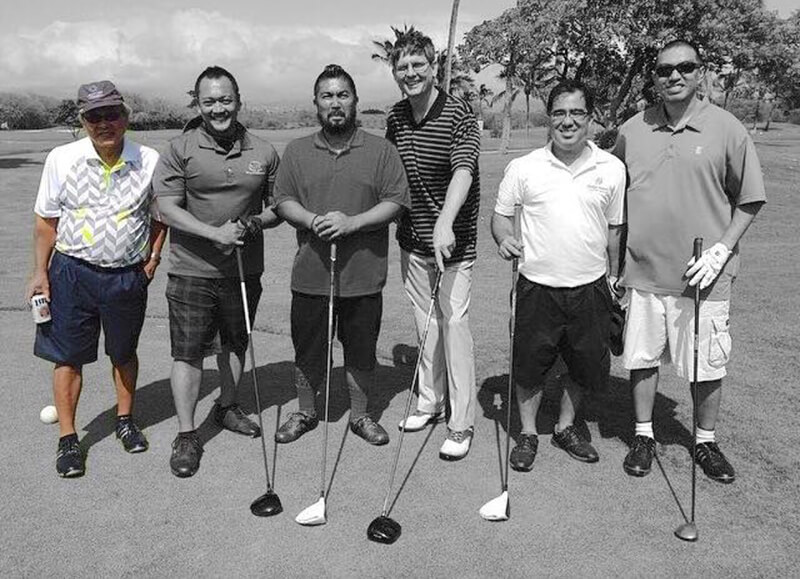
Photo courtesy: Bryan Andaya
Dumlao recalls how Justice Ramil often fondly reflected on his opinion in Konno v. County of Hawai‘i, which dealt with the issue of privatization. Justice Ramil wrote: “We emphasize that nothing in this opinion should be interpreted as passing judgment, one way or the other, on the wisdom of privatization. Whether or not, as a policy matter, private entities should be allowed to provide public services entails a judgment ordinarily consigned to the legislature. Our decision today merely applies the civil service laws of this state to the example of privatization at issue in the present appeal. As we have discussed above, privatization involves two important, but potentially conflicting, policy concerns. On the one hand, privatization purportedly can improve the efficiency of public services. On the other hand, privatization can interfere with the policies underlying our civil service, i.e., elimination of the spoils system and the encouragement of openness, merit, and independence. Given the importance of these policy concerns and the potential conflict between them, clear guidance from the legislature is indispensable… Privatization may, or may not, be a worthy idea; we do not, and indeed should not, express an opinion in this regard. But if privatization is attempted by the government, it must be done in accordance with the laws of this state.”
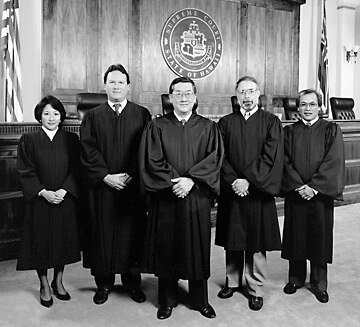
Photo courtesy: Honolulu Star Bulletin
Scott Arakaki, a past president of the Honolulu Filipino Junior Chamber of Commerce and who served as Ramil’s law clerk from 1994–1995, (and whose law firm Ramil later became Of Counsel to several years after his retirement) remembered Justice Ramil for “being thoughtful about how the Court’s opinions would affect legal precedence and work in the real world.” Arakaki said he recalls one opinion that Justice Ramil really was proud of: Bumanglag v. O‘ahu Sugar, a worker’s compensation case. Bumanglag, who did not complete high school, immigrated from the Philippines at age 37 and a year later, began working with O‘ahu Sugar. Seventeen years later, Bumanglag suffered a back injury, received workers compensation benefits, and got injured again. Bumanglag saw many doctors, including several doctors selected by the employer. The Labor Board ruled Bumanglag was permanently and totally disabled and O‘ahu Sugar appealed. O‘ahu Sugar argued that Bumanglag’s age, limited education, and limited transferable skills constituted odd-lot factors which would essentially reduce O‘ahu Sugar’s responsibility. Ramil dismissed O‘ahu Sugar’s arguments: “[A]side from Claimant’s age, it would be inaccurate to classify these odd-lot factors as disabilities because in all probability these were the very factors that caused Claimant to remain employed, thus providing Employer with valuable service for seventeen years.” Ramil said the use of “odd-lot factors such as education and transferable skills cannot be considered impairments of either a physical or mental function…” The Bumanglag decision reflected that Ramil never forgot his immigrant roots and the difficulties faced by those who toiled in labor. As Ramil stated during his confirmation hearings, you need a “Supreme Court with a human factor, with compassion and sensitivity.”
… you need a “Supreme Court with a human factor, with compassion and sensitivity.”
– MARIO RAMIL
“More than anyone else, Justice Ramil had the most profound influence on my career. The greatest gift he taught this boy from Hilo was to believe in himself when no one else believed he would ever amount to anything,” said Bryan Andaya, a past president of the United Filipino Council of Hawai‘i and currently the Chief Operating Officer of L&L Hawaiian Barbecue, who served as Ramil’s law clerk from 1998 to 2000. “He was kind, big hearted, and compassionate with a brilliant mind and the rare ability to relate to people of all walks of life.”
Andaya’s personal favorite of a Ramil opinion is State v. Rogan, where the unanimous Supreme Court overturned the conviction of a black man due to prosecutorial misconduct. During closing arguments the prosecutor made reference to the defendant’s race in attempting to inflame the jury into a conviction. “[W]e note that arguments by the prosecution contrived to stimulate racial prejudice represent a brazen attempt to subvert a criminal defendant’s right to trial by an impartial jury as guaranteed by both the sixth amendment to the United States Constitution and article I, section 14 of the Hawai‘i Constitution,” wrote Justice Ramil. “Such arguments foster jury bias through racial stereotypes and group predilections, thereby promoting an atmosphere that is inimical to the consideration of the evidence adduced at trial. Moreover, such an appeal to racial prejudice threatens our multicultural society and constitutional values.” Ramil reminded attorneys of their responsibilities: “Accordingly, appeals to racial prejudice lack the professionalism and decorum required of attorneys who practice before the bar of the courts of Hawai‘i and will not be tolerated.” Andaya said “For me, this case encapsulates Justice Ramil’s commitment to the Constitution as a safeguard against the tyranny of the majority and the abuse of power, and demonstrates his compassion for the underdog in society and belief in the good of humanity.”
Acoba provided another example where Justice Ramil was firm in his principles. Adequate compensation for court appointed lawyers became an issue in a case and Ramil believed that was endangering the indigent’s right of adequate representation. Ramil wrote that he “strongly urge[d] the Hawai‘i legislature to increase the hourly rate paid to court-appointed private counsel.” Ramil received criticism for urging the legislature to act but “strongly disagreed”, stating emphatically that he had done so because “I deem it my duty”.
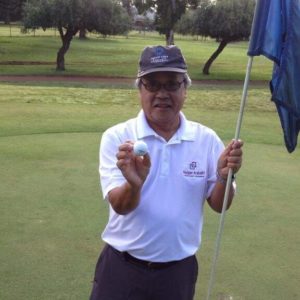
Photo courtesy Randy Iwase
Ramil served on the Supreme Court during a time when opinions were infrequently published. Acoba said Ramil strongly believed that as the highest court in the state, the Supreme Court’s primary function was to develop the law by issuing formal opinions that had legal binding effect. Ramil wrote that when there was an unpublished opinion and the justice who wrote a concurrence or dissent which would then not be published, the justice is “impeded in presenting his or her perspective of the law to interested parties.” Ramil cautioned that “we must be careful to never silence a justice.”
Ramil’s convictions, sense of justice, and empathy for the less fortunate will never be silenced because his opinions are part and parcel of Hawai‘i’s law.
Just call me “Mario”
But more than that, Justice Ramil will be missed for just being “Mario”.
Acoba said he was liked by everyone and had a subtle sense of humor. Ramil’s former law clerks spoke of his hosting bbq’s at his house. Campaniano recalls how he, Pablo, and Ramil would support each other and urge each other to “be the best that we could be in hopes that we would lead the way in our respective fields.”
When Ramil last visited Maui in late June 2016 with Campaniano, Ramil was in high spirits and enjoyed a dinner in Kaanapali with fellow former insurance commissioners and a second dinner in Kahului–a Kamayan style dinner at Tante’s with old and new friends. The old friends reminisced about golfing together and enjoyed the food prepared by Tante’s.
Golf became Ramil’s sport. (While at the Attorney General’s office, Ramil starred on the AG’s softball team called Robin’s Hoods alongside future Supreme Court Justice Robert Klein and future Public Utilities Commission Chairperson Randy Iwase, among others.) Ramil’s passion for golf was well known. When he retired from the Department of Labor, he was gifted with a driver that was manufactured in Japan and Ramil, on stage after accepting the gift, demonstrated his swing.
As a golfer, Ramil recorded two holes in one, and traveled to Ireland, Scotland, the Philippines as well as California and Arizona. Campaniano recalls that during the Ireland and Scotland trips, Ramil and State Representative Isaac Choy would engage in intense, head to head wagering over their rounds of golf, with the winner pocketing one euro. In retirement, Ramil would engage Iwase in weekly trash talking filled golfing matches. Iwase witnessed one of Ramil’s hole-in-ones a few years ago at Mililani Golf Club, hole #3. Iwase and Ramil weren’t sure if there was a hole in one. “Us two old futs couldn’t see what happened to the ball so we rushed to the hole and yes, a hole in one! We had such great times and the trash talking never stopped,” said Iwase.
“Us two old futs couldn’t see what happened to the ball so we rushed to the hole and yes, a hole in one!”
– RANDY IWASE
Campaniano said Ramil always looked forward to playing in local Filipino golf tournaments such as the State Fil-Am and the Filipino Chamber of Commerce Foundation, during which Ramil would mostly unsuccessfully try to beat Filipino Chamber past president Buddy Gendrano.
Integrity and Principled
Former Governor Benjamin Cayetano, who would occasionally golf with Ramil and always lose to Ramil, said: “Mario was a good friend, a good man who dedicated his life to serving Hawai‘i’s people. His soft-spoken, humble nature and sharp intellect earned him the respect of all who knew him. As only one of three Filipino-Americans who served on the Hawai‘i Supreme Court, Mario understood the importance of his role for the Filipino community. He did not disappoint, having served with honor and distinction. He will be missed.”
Acoba (also a golfer that Ramil consistently beat) called it a very sad day when Ramil passed. “It was truly a privilege to serve with Mario, but more so to know him. He was a sincere, dedicated, and principled colleague. Working with someone closely, especially on issues that may be controversial or intensely contested reveals the measure of a person. Justice Ramil must be measured as a courageous and independent jurist who deserved the respect of all.”
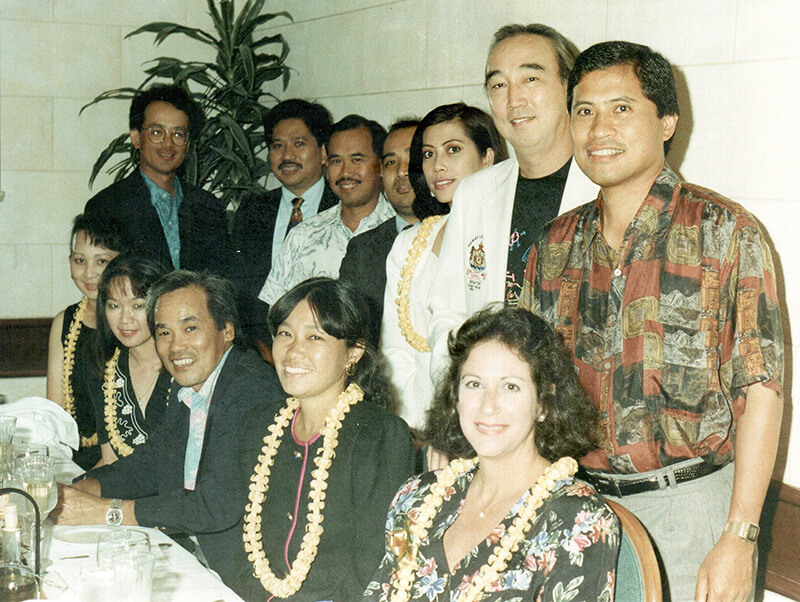
[row]
[column md=”6″]

[/column]
[column md=”6″]
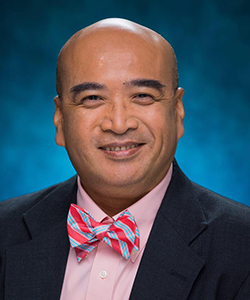
[/column]
[/row]
